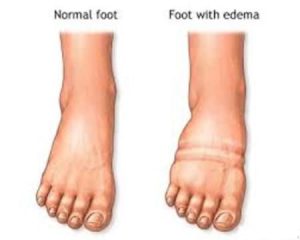Table of Contents
What is edema?

Edema or swelling is the puffiness of body parts due to the trapping of excess fluid in the tissues. Edema usually affects the feet, ankles, and legs. It can also affect the face and hands. Pregnant women and older adults are prone to edema, but it can happen to anyone.
Certain types of cancers and cancer treatments also cause edema.
How bad is my edema?
Limb-discrepancy is a difference in size between the length of both arms or both legs.
Mild: 10% limb discrepancy; swelling in your legs, ankles, and feet (not related to an injury). Mild edema can be safely managed at home. Follow the tips given in the section below.
Moderate: 10 – 30% limb discrepancy; stretched, and shiny skin; puffiness of face and hands. It may limit instrumental activities of daily life (preparing meals, managing money, shopping, doing housework, and using a telephone). Most of the times it can be managed at home. Sometimes it may require the medical assistance.
Severe: 30% limb discrepancy; It can make you feel uncomfortable by restricting the movement in your ankles and wrists. It may limit your self-care activities of daily life (eating, dressing, getting into or out of a bed or chair, taking a bath or shower, and using the toilet). Seek medical help immediately if it has not improved after treating it at home for a few days.
How to manage mild edema?
Keep track of swelling using Ankr (myAnkr web portal or the Ankr app). It will help you describe the discomfort to your doctor or nurse.
- Put a pillow under the legs while lying down or sitting for prolonged periods. (Keep your legs elevated above the level of your heart.)
- Do not sit or stand for long periods of time without moving.
- Wear support stockings, which put pressure on your legs and keep fluids from collecting in your legs and ankles. These stockings are available at most drugstores.
- Ask your doctor about limiting your salt intake.
- Follow your doctor’s directions for taking prescription medications. Your doctor might want you to take a diuretic (commonly called a “water pill”), which helps your body get rid of excess fluid.
- Protect any swollen areas from additional pressure, injury, and extreme temperatures. Injury to the skin over swollen areas takes longer to heal and is more likely to become infected.
How to manage moderate and severe edema?
Seek medical help if you have swelling, shiny skin, or skin that retains a dimple after being pressed (pitting). See your doctor immediately if you experience:
These can be signs of pulmonary edema, which requires prompt treatment.
If you’ve been sitting for a prolonged period, and you develop leg pain and swelling that won’t go away, call your doctor. Persistent leg pain and swelling can indicate a blood clot deep in your vein.
What causes edema?
Edema (dropsy) is the accumulation of extra fluid that builds up in the tissues of the body. Many things can cause fluid to build up.
- Sitting or staying in one position for too long
- Eating too much salty food
- Having premenstrual signs and symptoms
- Pregnancy
- Kidney cancer
- Liver cancer
- Ovarian cancer
Edema can be a side effect of some medications, including:
- High blood pressure medications
- Chemotherapy drugs
- Non-steroidal anti-inflammatory drugs
- Steroid drugs
- Estrogens
- Certain diabetes medications called thiazolidinediones
Some health problems (congestive heart failure, liver disease, and kidney disease), can cause edema. You cannot catch edema (swelling) from other people. It does not run in families.
